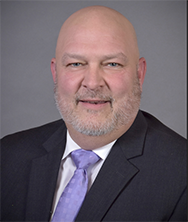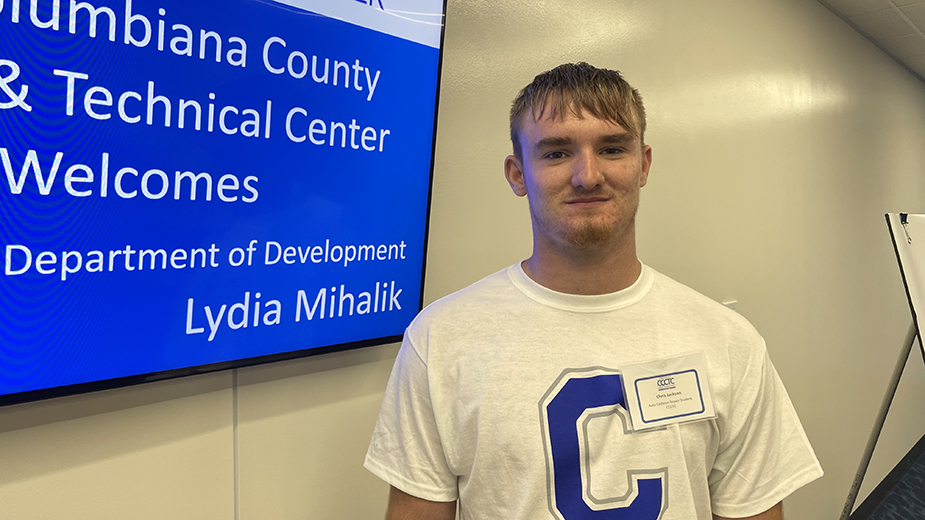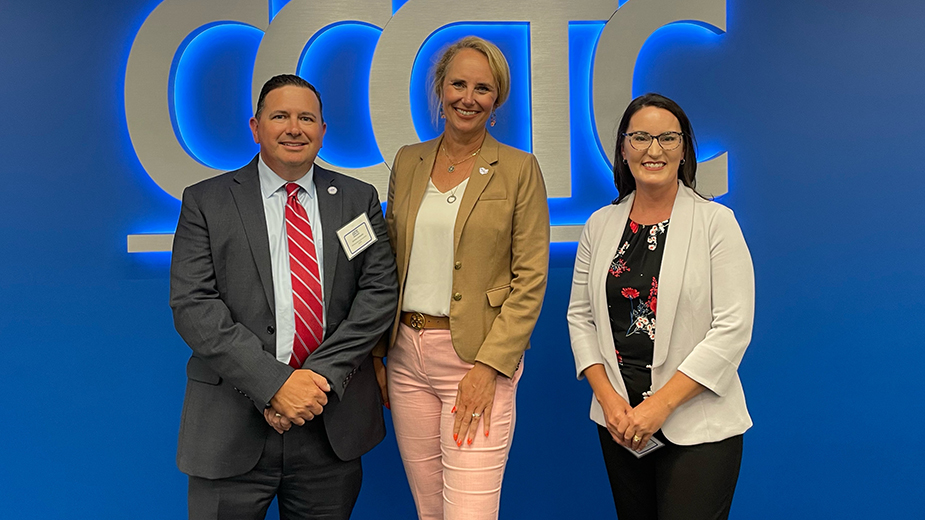YOUNGSTOWN, Ohio – Early in his career, John Zehentbauer’s job was to push airplanes away from the terminal at Dulles Airport using a bulky, electric tug vehicle with heavy lead-acid batteries.
“We plugged it in every night and we would get up and we would run this thing four or five hours,” says Zehentbauer, now superintendent of the Mahoning County Career and Technical Center. He is amazed at how far batteries and efficiency have evolved in 30 years.
“The technology is absolutely new but it’s amazing how technology made it very useful now and practical for the average person.”
With projections estimating that electric vehicles will create 25,400 jobs in Ohio by 2030 and about half of them here in northeastern Ohio, educators in the Mahoning Valley are considering how to adjust their training programs.
By 2032, EVs are expected to surpass internal combustion engine vehicles as the primary mode of transportation, according to a report released by the Governor’s Office of Workforce Transformation and the Ohio Manufacturers’ Association.
With 67% of U.S. sales expected to be for EVs at that point, there will be an increasing need for trained individuals to assemble the new vehicles, develop new batteries, build the charging infrastructure and repair all of it when something goes amiss.
The jobs will vary from requiring some skills training in high school to those who go on to obtain bachelor’s degrees or beyond.
LOCAL TRAINING
In October 2022, the Mahoning County Career and Technical Center broke ground on the $1.1 million Innovative Energy and Technology Workforce Training Center, which will be used for training for both EVs and the required charging stations, as well as green energy sources such as wind turbines and solar panels.
Expected to be ready for classes in mid-September, the new structure – currently nicknamed the Energy Building – is offering a learning experience for students even before it opens.
Students will help install the solar panels and the computerized HVAC system for the building. The 3,000-square-foot building will be one of several places high school and adult students will learn safety measures for working with electricity.

“We’re not YSU or Ohio State. We’re not building 50,000-square-foot buildings. But it’s very useful and very practical for the number of students that we serve,” Zehentbauer says. The space, he says, is very open with a lot of electric conduits and will allow the staff to teach a variety of skills, including EV chargers and the latest batteries that will power the future.
Currently, the Mahoning career center has multiple programs that train students on lithium ion batteries that charge everything from electric bicycles to drones to vehicles in the automotive program.
Zehentbauer does not think it is enough for just the students in the automotive programs to learn how to work with wind, solar, and other energy sources to charge these electric batteries. He believes the learning must tie into the Intel chip manufacturing plant to be constructed in the Columbus area.
“The bottom line is we want all of our students to leave here and have the understanding that these things are all interconnected and it’s important that you have a good basic understanding when you graduate,” Zehentbauer says.
FUNDING FOR CAREER TECH
Along with the Electric Vehicle Workforce Strategy launched by Gov. Mike DeWine’s office, state officials have set aside up to $300 million for career tech centers, with about $200 million for construction and expansion and the other $100 million for equipment.
On Aug. 15, the Columbiana County Career and Technical Center took steps toward the EV future as it unveiled an expansion plan. Assistant Superintendent Jeremy Corbisello says the school hopes to tap that funding resource for $5 million of the $8 million they need for the expansion project.

CCCTC, built in 1977, was constructed for classrooms of 12 students. Most of the programs taught there today have up to 25 students. The proposed addition would create space for both the automotive tech and automotive collision and repair programs, giving the program the opportunity to work on electric vehicles with the new equipment. Additionally, the space currently used for automotive programs would be converted to solar and energy storage, while other spaces will be transformed to teach semiconductors and robotics.
“Dealership representatives in the area say they need a workforce for maintaining and repairing electric vehicles. We’re also in the Voltage Valley – we know there is a skills gap,” says Corbisello.
Lydia Mihalik, director of the state development department, says it’s important for people to be trained in the entire lifecycle of the EV, from creation, to charging to repairs. Mihalik attended the Aug. 15 announcement at CCCTC.
John Kufleitner, president of the Kufleitner Auto Group, owns some of those dealerships that need workers who can fix internal combustion engines, EVs and hybrids.
He visits the career centers in Columbiana and Mahoning counties, where his dealerships are located, to find employees.
“Everywhere you go, someone is looking to hire,” Kufleitner says. “For us, we’re trying to grow our workforce, especially on the service side. With prices today, the state of the economy, interest rates, people are fixing their cars. They’re investing, reinvesting in their cars, and getting more service out of them.”
A GROUP EFFORT
Zehentbauer and Jennifer Oddo, YSU’s vice president of workforce education and innovation, were among the 30 people on hand for the roundtable discussion at CCCTC on training the future EV workforce.
“We know we can’t build a workforce like we need to by working individually in silos,” Oddo says.

The demographics of the college student are evolving and students do not have to start college right after high school. Many are starting by gaining skills at their local career and technical centers and then finishing at YSU.
“We have to meet the students and the communities where they are to have an effective program,” says Oddo. “So that’s going to be the strategy as we move forward – leveraging the great assets of career and technical centers along with the sector partnerships and all the resources around higher education to make sure we have a journey for the students. Just because they start here at the career and technical center doesn’t mean they can’t evolve into an apprenticeship program and a two- or four-year degree.”
In addition to programs at YSU, Eastern Gateway Community College recently was awarded $914,000 in federal funding for EV technology training, including installation of equipment and technology.
NOT JUST FOR EVs
Jessica Borza, executive director of the Mahoning Valley Manufacturing Coalition, says work needs to be done to plan all the skills workers need to be successful in the EV industry.
Those at the state level developing the EV curriculum know some of those technical skills are already being taught in other programs, Borza says. It is more about developing the pathways that make certain people have the training for where they want to go.
“We don’t want to have everybody clamoring to train for the next shiny object,” Borza says. “We want to be smart about it and make sure that we’re filling classes and giving people lots of options including EV. That’s what I’m excited about – helping to figure out what that looks like and how it can help our EV manufacturers, and all manufacturers in the Mahoning Valley.”
Borza says state research shows about 80% of the skills and competencies of someone trained at an EV technician level can cross over into other areas such as automation and robotics, defense supply and advanced manufacturing.
She believes educational programs in industrial maintenance, automation and robotics are just as relevant as EV jobs; it is just a matter of mapping what is being taught and then filling in any gaps in the curriculum.
Pictured at top: Columbiana County Career and Technical Center Assistant Superintendent Jeremy Corbisello; Lydia Mihalik, director of the Ohio Department of Development; and Jessica Borza, executive director of the Mahoning Valley Manufacturers Coalition, were among 30 people who met Aug. 15 to discuss EV-related skills.
